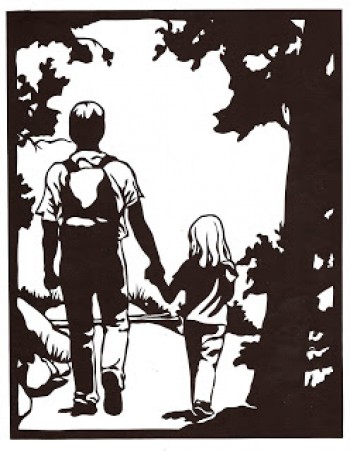In the spring of 2020, all the temples were closed.
A few days later, my grandma showed up in my living room. Which wouldn’t have been so concerning had she not died twenty years ago.
At first I thought it was just me. An effect of extended isolation on my mental well-being, perhaps. But then some of my neighbors took to social media.
Does anyone have any tips for getting rid of ghosts??
You have one too?
3 at our house. They’ve taken over the basement!
Maybe garlic?
That’s vampires.
Try sprinkling peppermint oil around your house and putting a dab of clove oil behind your ears.
It soon appeared that every home in the neighborhood had at least one visiting relation. And as the days stretched on, we learned that the phenomenon was not limited to our suburb. A homeowner in Texas accidentally shot a hole through his back door when he wandered into his kitchen and found the specter of Davy Crockett rummaging through his junk drawer. And one couple in France was abruptly awakened on a Sunday morning to find Benjamin Franklin snuggled in between them like a child who’d had a nightmare.
Our new houseguests couldn’t communicate audibly, so we were left to conjecture as to their sudden arrival. The church released a statement about how, since the temples were closed, perhaps these spirits were seeking refuge in the home, another holy place. They quoted scripture—“neither can we without our dead be made perfect”—and they said that we’d been focusing on baptizing the dead, but now it was time to learn from our ancestors. Personally, I wasn’t sure what my grandma could teach me without any kind of discourse. It seemed like she just wanted to watch me go about my day, though I felt a little self-conscious, having her eyes on me all the time. I tried asking her questions, but she didn’t attempt to answer. Larissa Palmer down the street found an old Ouija board and thought that it might be a promising way to communicate with the spirits. They didn’t seem interested, though. Her own ghost rolled his eyes when she pulled out the board, finally indicating the letters that spelled out the phrase, “Put that nonsense away and find me a damn cigar.”
But it didn’t actually matter why they were here. We couldn’t get rid of them, so we adapted. A new trend appeared on social media called “ghosties,” where people would post selfies with their ghosts. Unfortunately, the ghosts didn’t appear on camera, so most of the pictures just looked like a normal selfie of you, standing in your empty bedroom, pointing at nothing.
Some people started attaching social status to the quality of their haunting. After digging through their family tree, the Millers proudly announced that the monk who regularly interrupted their family scripture study with wild gesticulating was none other than Martin Luther. And Sister Jordan, who had always faithfully done her family history work, claimed to know immediately that the woman who sat stoically in her late husband’s easy chair was Harriet Tubman. Both women seemed pleased with the company.
Of course, most of us just kept living our lives. Rebecca Cho told me that her great-aunt Deborah had taken to following her around the house, shaking her head disapprovingly as she watched Rebecca complete housework. It was a little obnoxious, sure. But Aunt Deborah also taught Rebecca some great recipes, standing over her shoulder and pointing at the spice cabinet as Rebecca cooked.
As for me, my grandma’s arrival didn’t really change my day-to-day. For the most part, she didn’t demand any attention. She often sat in the corner of the room, an adoring smile on her face as she watched my kids play together, or read over my shoulder as I worked on a writing project. I was nine when she had died, and most of my memories of her were tainted by cancer. I didn’t remember her looking so fresh, with plump cheeks that pinked up when she smiled. Sometimes she would stand by the bookcase and indicate to a book she wanted me to open, and in a quiet moment we would sit on the bed together and flip through a Romantic poetry anthology or a collection of fairy tales. I hadn’t known how much she loved reading. And one day I found her sitting at the piano, her eyes closed, her fingers poised, melting down into the keys as she tried to play a song. I sat on the bench next to her, and she looked excited, pointing to one specific book of Debussy songs. I flipped through the pages until she motioned for me to stop at an Arabesque. The book fell open easily, the spine worn on what was one of my own favorite songs to play. And as I sat at the piano, my fingers strong and willowy, my grandma closed her eyes and placed her wispy hands over mine, and together we swayed as the notes filled every empty place.


